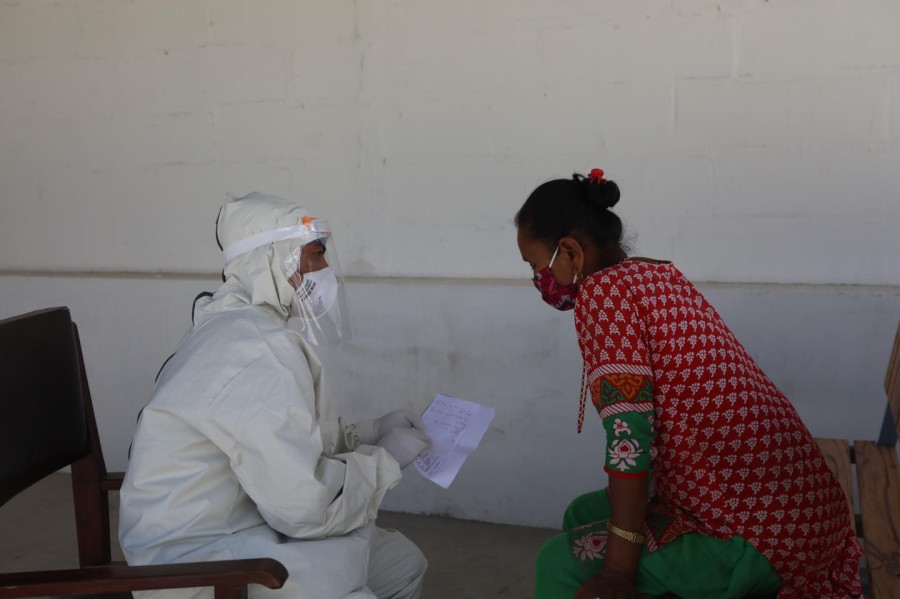Health
Media’s tendency to link every death to Covid-19 is spreading misinformation and stigma, say doctors
Doctors believe media portals need to exercise caution while publishing stories about the coronavirus as false reports can be very damaging to the social fabric.
Arjun Poudel
When a 34-year-old woman from Chandragiri Municipality died in the course of the treatment in Kathmandu’s Bir Hospital on Monday afternoon, it didn’t take long for news portals to speculate that she had died as being a result of Covid-19.
While the woman was being treated for pneumonia, which is a symptom of Covid-19, her nasal and throat swabs were negative for the coronavirus, meaning she was not infected with the disease.
But soon after the woman died, the municipal chair from her ward posted a status on social media, stating that she had died of the coronavirus and urging her friends, relatives and neighbours to get tested at the Sukraraj Hospital.
“Some people from Chandragiri Municipality came to our hospital for the coronavirus test yesterday because of the news and the confirmation of the virus from their ward chair,” Dr Sher Bahadur Pun, a virologist at the Sukraraj Tropical and Infectious Disease Hospital in Teku, told the Post. “The ward chair has since removed his Facebook post after police warned him that he could be prosecuted for fear-mongering.”
According to the doctor, it is one thing to be cautious and another to spread panic during a pandemic.
Ever since fears over the Covid-19 pandemic began to reach Nepal, there has been an alarming tendency to relate every death and sickness to the coronavirus, said Pun. While many online news portals are quick to speculate and use click-bait headlines in order to gain anxious visitors during the lockdown, even responsible members, including some respected media outlets both print and online, can be seen spreading misinformation and stigmatising the sick and the deceased.
Fears of Covid-19 fears have driven many people in different parts of the country to visit their nearest hospitals and health facilities with complaints of flu-like symptoms. And news and posts on online portals and social media only exacerbate this fear. They have also become a vector of spreading stigma against a sick person and his family, say doctors.
When a patient at Patan Hospital in Lalitpur died on Monday morning, some online news sites and TV stations once again branded the deceased a suspected Covid-19 patient. Hospital officials said that the deceased patient was misrepresented, despite them clearly telling the media that the patient was not in the isolation ward being treated for coronavirus.
Similarly, on Sunday, many news media linked the death of a 34-year-old man, a migrant worker who had returned from the UAE, to a possible coronavirus infection. The man was being treated at a temporary hospital in Butwal. But the results of his swab tests at the National Public Health Laboratory were negative.
Unverified and unconfirmed news reports are not only causing fear and confusion among the public but are also promoting the ostracisation of one’s own friends and neighbours, Pun, the virologist at the Sukraraj hospital, told the Post.
“It is like a witch hunt, where people are banding together against a sick or dead person and their family. These news reports about ‘suspected coronavirus’ patients dying are disturbing social harmony,” Pun said.
A doctor at the Sukraraj Hospital said that a man who returned from the Middle East some three weeks ago had visited the hospital for a coronavirus test.
“The man said that he had been examined at a private clinic but his neighbors pressured him to undergo a test in our hospital,” the doctor said on condition of anonymity. “The man complained that he was forced to come to the hospital as villagers had prevented him and his family members from leaving their homes.”
There have been reports of people with the flu and common cold compelled to walk for hours to reach the hospital due to pressure from villagers. Some flu patients are compelled to use ambulances paying thousands of rupees to come to Sukraraj hospital.
Health experts say even patients suffering from fever do not necessarily mean that they might have a coronavirus infection, as fever is not a disease but only a sign of health problems. But even doctors are panicked and have stopped attending to fever patients.
“News about the death of corona suspects has caused more panic in the public,” said Dr Khem Karki, Health Minister Bhanu Bhakta Dhakal’s advisor. “We will request the media not to publish such news and draw the attention of the Nepal Press Council.”
The season for the flu, malaria and dengue has started in Nepal, all of which cause fever and kill people every year.
So far, Nepal has reported five cases of Covid-19, four of them live cases and one recovered.




 14.24°C Kathmandu
14.24°C Kathmandu















